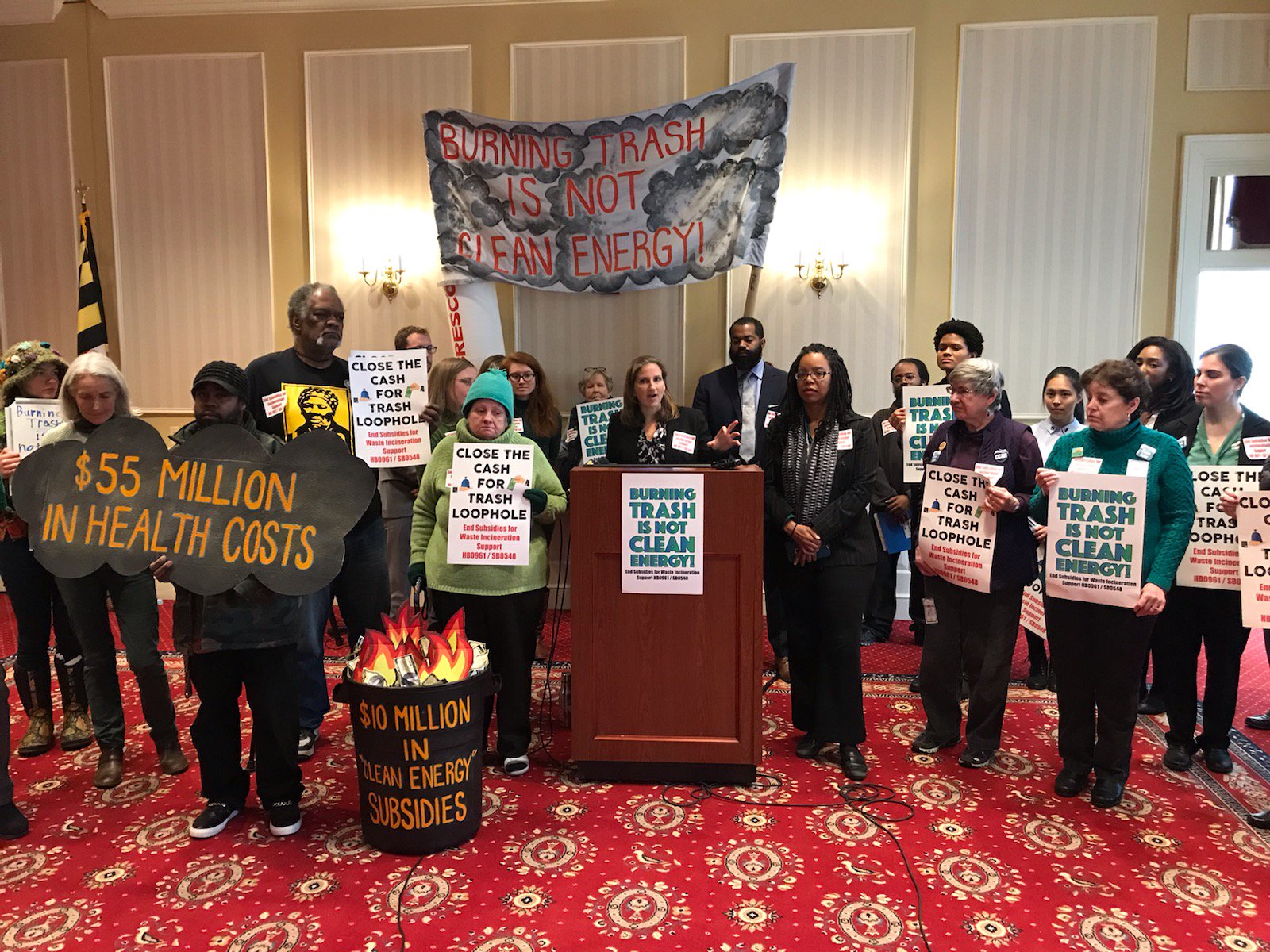
On March 8th, an unlikely alliance of Republican and Democratic legislators, residents from across Maryland, and environmental advocates gathered to demand the end of public subsidies for trash incineration in the state’s Renewable Portfolio Standard.
Surrounded by a trash can filled with mock flaming cash and a hand-made replica of the BRESCO incinerator, the coalition called for the passage of legislation that will end incineration subsidies (HB961/SB548) before a key committee hearing. The legislation, sponsored by Republican Senator Mike Hough from Frederick and Carroll Counties and Democratic Delegate Nick Mosby from Baltimore City, will be heard in the House Economic Matters Committee. It aims to remove incineration from the state’s Renewable Portfolio Standard (RPS), where under its current status as “renewable energy” the industry receives significant ratepayer subsidies.
Senator Mike Hough of Maryland’s 4th District said, “It’s simply wrong for taxpayers to subsidize Maryland’s incineration plants, which are health hazards for the surrounding communities. This is a prime example of taxpayers being ripped off, all for something they don’t even support.”
Delegate Nick Mosby of Maryland’s 40th District said, “Burning trash is not clean energy — in fact, it’s even worse for the climate than coal. I introduced this legislation because we should be incentivizing wind and solar instead of harmful trash incineration.”
When incinerators burn trash, they emit more greenhouse gasses per unit of energy generated than even coal, the dirtiest of fossil fuels. But Maryland subsidizes trash incinerators in our state’s RPS — wasting ratepayer money that that is meant to promote wind and solar power. The BRESCO trash incinerator operated by Wheelabrator in Baltimore City has received $10 million worth of ratepayer subsidies over the past six years.
Meanwhile, this facility causes over $55 million in adverse health effects annually, according to a study commissioned by the Chesapeake Bay Foundation. In Montgomery County, the Dickerson incinerator operated by Covanta emits roughly 390,000 tons of air pollution each year -- more than the nearby coal-fired power plant.
Terrel Askew, Leadership Organizer with United Workers, said, “We must take serious steps toward building a better and more sustainable future, one that prioritizes our communities and our planet. We must move away from both incineration and the fool's notion that we can continue to sustain ourselves on burning our waste; removing these subsidies has to be the first step.”
Lauren Greenberger, president of Sugarloaf Citizens Association, said "It is astounding to the communities that surround the trash incinerator in Montgomery County that Maryland would continue to give clean energy credits to a facility that unleashes toxic emissions into the air that my children breathe and onto our farm fields. The cattle on my land are pasture raised and grass fed but I could never designate them as organic because of the toxins with which this incinerator infects them. On behalf of my community, I beg our elected officials to do the right thing and remove incineration from the RPS."
"As a Baltimore resident, I am deeply disturbed knowing that Maryland's top-tier, clean energy program is subsidizing a polluting smokestack in my backyard," said David Smedick, Campaign and Policy Director for the Maryland Chapter of the Sierra Club. "The Baltimore incinerator is receiving millions of dollars every year that would otherwise be going to clean energy investments like wind and solar. Maryland's General Assembly has been talking about this problem for too long. It's time to take action by removing subsidies for trash-burning plants and invest in the clean energy needed to fight air pollution and climate change."
Jennifer Kunze, Maryland Program Organizer with Clean Water Action, said, “When I was in high school, my hometown of Frederick decided to build a new trash incinerator to burn Frederick County’s and Carroll County’s waste. A powerful bipartisan coalition formed that ultimately prevented that incinerator from being built. Now the same activists are working to build less costly zero waste alternatives like composting and recycling - and the same work is happening in county after county across Maryland. We don’t need to incinerate our trash; and we certainly don’t need to give incinerators subsidies they don’t deserve.”
Brooke Harper, Political Chair of the NAACP Maryland State Conference, said, “The people of Maryland should not have to pay extra on their utility bill to harm their own health. It’s time to end public subsidies for dirty trash incineration.”
Taylor Smith-Hams, Healthy Communities Campaign Coordinator with CCAN Action Fund, said, “We now waste public money that is meant for clean energy on dirty incineration that harms communities. This unjust and illogical policy flaw must be remedied — incineration must be removed from the Renewable Portfolio Standard this year. Marylanders should not be paying to pollute our own communities.”
Rather than burning trash, advocates are calling for a just transition from incineration to zero waste that protects workers and communities and makes the necessary investments in alternatives like composting, recycling, reuse, and source reduction. Removing trash incineration from the RPS would allow truly clean energy sources to grow and thrive in Maryland. More clean energy means healthier communities, cleaner air and water, less climate pollution, and thousands of new jobs.
###